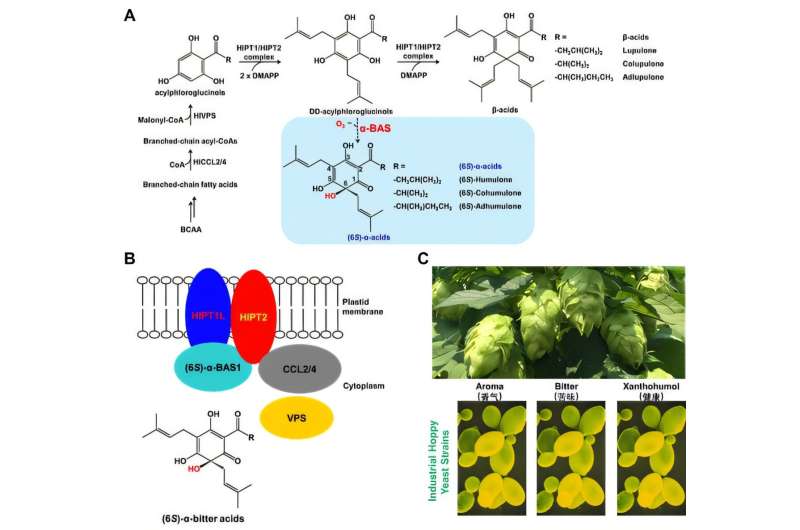Science
Researchers Unlock Secrets of Hops to Enhance Beer Flavor

Hops have long been recognized as a vital ingredient in brewing beer, contributing not only to its flavor but also to its preservation. Recent research from a team led by Prof. Wang Guodong at the Institute of Genetics and Developmental Biology of the Chinese Academy of Sciences has made significant strides in understanding how hops produce chiral α-bitter acids, which impart the characteristic bitterness to beer.
The study, published in Plant Communications, details the role of specific enzymes in the biosynthesis of these acids, an area that had remained unclear for over a decade. While the overall biosynthetic pathway had been established, the exact function of the enzyme known as α-bitter acid synthase (α-BAS) was not confirmed until now.
Breakthrough in Hops Research
The researchers developed a sensitive liquid chromatography–mass spectrometry (LC–MS) detection method to distinguish between two chiral forms of α-bitter acids, known as 6S and 6R. Their findings indicated that hop glandular trichomes predominantly accumulate the 6S-type α-bitter acid. This discovery is pivotal, as it clarifies the biochemical processes involved in hop flavor development.
The precursor to these acids, deoxy-α-bitter acid, undergoes spontaneous oxidation when exposed to air, creating a racemic mixture of both chiral forms. This chemical reaction had previously obstructed efforts to verify the function of α-BAS. By overcoming this challenge, the team created a yeast heterologous expression system and examined more than ten candidate genes, identifying HlMO18 as the crucial enzyme that catalyzes the conversion of deoxy-α-bitter acid to the 6S form.
Implications for the Brewing Industry
The research not only maps the biosynthetic pathways of α-bitter acids but also highlights the specific amino acid residues essential for the enzyme’s activity. The findings reveal that the 6S-type α-bitter acid synthase forms a metabolic complex with upstream enzymes, which explains the accumulation of the 6S form in hop glandular trichomes.
With this understanding, the researchers aim to leverage synthetic biology to engineer industrial yeast strains capable of producing “hoppy beer.” This innovation promises to create authentic hop flavors without the need for actual hop plants, potentially reducing production costs and allowing for the development of customized, flavor-rich beers.
The outcomes of this study not only advance the scientific understanding of hops but also pave the way for exciting new possibilities in the brewing industry. As the team continues its research, the future of beer production may see significant transformations, driven by these groundbreaking discoveries.
-

 World3 weeks ago
World3 weeks agoGlobal Air Forces Ranked by Annual Defense Budgets in 2025
-

 World3 weeks ago
World3 weeks agoMass Production of F-35 Fighter Jet Drives Down Costs
-

 Science3 weeks ago
Science3 weeks agoTime Crystals Revolutionize Quantum Computing Potential
-

 Top Stories3 weeks ago
Top Stories3 weeks agoNew ‘Star Trek: Voyager’ Game Demo Released, Players Test Limits
-

 World3 weeks ago
World3 weeks agoElectrification Challenges Demand Advanced Multiphysics Modeling
-

 Top Stories3 weeks ago
Top Stories3 weeks agoDirecTV to Launch AI-Driven Ads with User Likenesses in 2026
-

 Entertainment3 weeks ago
Entertainment3 weeks agoFreeport Art Gallery Transforms Waste into Creative Masterpieces
-

 Lifestyle3 weeks ago
Lifestyle3 weeks agoDiscover Reese Witherspoon’s Chic Dining Room Style for Under $25
-

 Health3 weeks ago
Health3 weeks agoGavin Newsom Critiques Trump’s Health and National Guard Plans
-

 Lifestyle3 weeks ago
Lifestyle3 weeks agoLia Thomas Honored with ‘Voice of Inspiration’ Award at Dodgers Event
-

 Politics7 days ago
Politics7 days agoLanguage Evolution: New Words Spark Confusion in Communication
-

 Entertainment3 weeks ago
Entertainment3 weeks agoFast & Furious Coaster Hits the Track at Universal Studios








